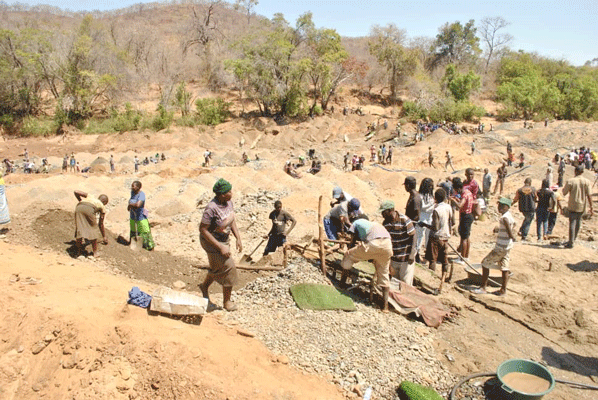
BY JAIROS SAUNYAMA
“We used to see hippopotamuses here. There was a big pool along this river that used to be a habitat of hippos, but they have since migrated. The other hippo was spotted down there and some villagers say it has found a new home down the river,” said 56-year-old Paul Chimowa from Maramba.
His tale seems to be a joke for first-time visitors to Mazowe River. Today, the giant river is in desolation, as both gold panners and foreign-owned gold mines have choked it through poor mining methods.
At some points, the river is diverted to another direction to allow alluvial gold panning to take place.
“This has become the norm. The community depends on alluvial gold panning and despite the negative impacts of such acts on the environment, we will continue panning,” added Chimowa.
A shanty settlement has since been erected on the banks of Mazowe River in the Kusokoteka area with traders from all over Zimbabwe camping as they sell their wares to the gold panners.
At least 600 villagers, among them teachers, headmasters, children and the elderly, invade the river channel on a daily basis as they search for the precious mineral for survival.
“We are hungry, there is no food in this area. Maramba-Pfungwe is a dry area, it experiences perennial droughts and the government is aware of it. We have no option, but to search for gold. Food aid is history. The government through the Social Welfare ministry last came some months ago. When they came to my area, only a few people benefited,” said another villager Maria Masuku (29).
- Chamisa under fire over US$120K donation
- Mavhunga puts DeMbare into Chibuku quarterfinals
- Pension funds bet on Cabora Bassa oilfields
- Councils defy govt fire tender directive
Keep Reading
Hunger and a deteriorating economy have pushed villagers in this area to the river where they are destroying the environment through archaic means of gold searching. The law enforcement agencies have failed to remove the gold panners despite numerous efforts.
A government worker in the area who refused to be named said it was high time authorities formalised alluvial gold mining along Mazowe River as well as empowering villagers with mining equipment.
“Traditionally, villagers would pan for gold along the river during the winter season but on a low scale. It was done in harmony with nature. Despite hunger, the invasion of the river was also fuelled by mechanised miners. The villagers then knew they could get gold even through digging the channel as compared to the surface.
“Government is erring in not offering the local communities gold claims. We have foreign companies from China and Belarus who are preferred ahead of the locals. Government should just give these villagers some gold claims and empower them with modern mining techniques to avoid environmental degradation,” said the official.
A few kilometres from Kusokoteka, some foreign mining companies have also choked the river bed with their mining activities as they search for gold. The Standard discovered that there are no efforts for reclamation of the river bed. It is reported that some company from Belarus owns a gold claim that stretches for 80km along the same river.
Mazowe River is a source of life for both villagers from Mashonaland East and Central provinces who depend on its water for both farming and domestic purposes. Mashonaland East provincial Environmental Management Agency (EMA) information and publicity officer Astas Mabwe confirmed that the mighty river was under siege from gold mining activities.
“EMA is aware of what is happening along Mazowe River. The river is under siege and recently we issued a $60 000 ticket to a group of illegal panners. We are also urging the miners to regularise their activities through securing the necessary papers as well as doing some educational campaigns on the need to preserve the environment,” he said.
Maramba legislator Tichaona Karimazondo said although there is need to save the environment, the local community depends on gold panning for survival hence the need to formalise their activities.
“Alluvial gold mining has been happening in this area for a long time. However, we are now facing a challenge of scores of people coming from other areas in search of gold. This area is a dry region and farming is a futile exercise. The only way to get money and food is through gold trading. I urge the authorities to consider the plight of these villagers through empowering them,” he said.
According to the miners, a gold point sells for US$4 while a gramme costs US$40.
During gold extraction, the panners, popularly known as makorokoza, use a lot of mercury which is deadly to the environment and a threat to human life. Zimbabwe in October 2013 joined other countries and signed the Minamata Convention on mercury use.
The Minamata Convention is named after the Japanese city of Minamata, which experienced severe, decades-long mercury poisoning after industrial waste water from a factory was discharged into Minamata Bay. The local people who consumed seafood from Minamata Bay became very sick, while several others died or got disabled.
According to Section 73 of Zimbabwe’s Constitution, citizens have a right to a clean, safe and healthy environment.
Today, Chimowa boasts as one of the living souls to have witnessed hippos swimming along Mazowe River. However, he is bitter that the younger generation will never have a chance to see the endangered species as gold panning is deciminating the once mighty Mazowe River. Today, the river bed is laden with heaps of soil while mercury has been discharged frequently into the environment.










